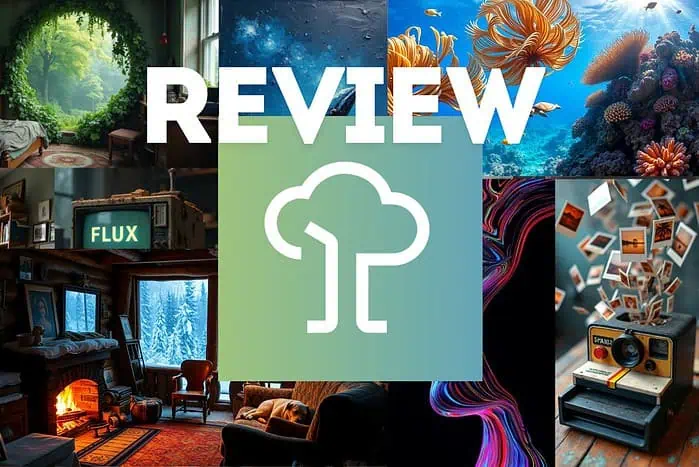
In this Flux.1 review, I’ll share some insights into this powerful tool and its capabilities. I’ve taken the time to test every aspect of the app and compare each feature with the capabilities of similar software.
Let me show you the results and help you decide if it’s the right option for you! Flux.1 is an advanced AI-powered image generation platform that aims to revolutionize visual content creation. It uses machine learning algorithms to transform text prompts into high-quality, detailed images.

What sets Flux.1 apart is its range of models tailored to different needs and use cases. Now, let me show you what the platform offers in more detail: Flux.
1 has a pretty impressive AI image generator that uses prompts and customization features from the app’s interface. To test it out, I used the default AI engine with my trial license. As you can see from the image above, I added my prompt into the text box, selected the Image Dimensions format, and clicked Run.
That’s all there is to it. Each image generated with the software costs one credit . It takes about 20 seconds for each image to be generated, which is pretty decent.
Flux.1 is quite similar to Stable Diffusion and Midjourney regarding image quality and adherence to text prompts. Both models are known for their high-quality, photorealistic images and detailed scene compositions, much like Flux.
1. If you’re looking for something that matches Flux’s speed and efficiency, 1 Schell, DALL-E 3 , and Microsoft Designer’s Image Creator are also good options. If you’re looking for high-detail, photorealistic images, Flux.
1 might be the way to go. For creative and diverse outputs, DALL-E 3 is a solid choice. If speed and ease of use are your top priorities, Microsoft’s Designer’s Image Creator could be the best fit.
If you’re looking to take your image generator results to the next level, I suggest checking out Flux.1 AI Prompt Generator. Let’s dive into this feature together.
This tool helps you get the most out of Flux.1 AI. The AI prompt makes it easier to create more effective and precise prompts, which leads to even better image generation .
As you can see from the image above, I gave the engine a straightforward and short prompt to see how well it can transform it. The resulting prompt was very interesting and has generated the following image: I was pretty happy with the final result, especially since I had to start from scratch with no detail in the initial prompt. While Flux.
1 excels in creating detailed and photorealistic prompts for high-quality image generation, you can also use PromptHero . It offers a vast database and user-friendly interface for exploring and managing prompts across multiple AI models. If you’re looking for detailed and photorealistic outputs, Flux.
1 might be the better choice. On the other hand, if you want a wide range of prompts and ease of exploration, PromptHero is ideal. This feature lets you reverse-engineer prompts from existing images.
Just upload an image, and Flux.1 AI will try to generate a text prompt that could recreate a similar image. To test it, I dropped an image of a laptop on a desk with a lamp and a plant into the AI, as you can see below.
The results were even better than I expected. The description of the image is perfect, which could be very useful in everyday AI usage. Of course, there are other similar options like OpenAI’s CLIP model .
It is designed to understand and describe existing images by connecting them with text descriptions, which is useful for image analysis and content identification. However, Flux.1’s image-to-prompt tool is great for creating detailed and realistic prompts from images.
It’s perfect for making high-quality text prompts for new image generation. Either of them will help you create easy prompts from an image, but I prefer the Flux.1 interface.
This specialized tool is designed to generate anime-style images using Flux.1 AI. It’s an excellent feature for anime enthusiasts, illustrators, or anyone looking to create unique anime-inspired artwork.
To start, I uploaded a stock image of a person, and for the prompt I only wrote ‘anime’, in order to give the software the freedom to create. As you can see from the screenshot above, it did a very good job of transforming the original picture into an anime version. I liked that it didn’t distort the original and kept the clarity and colour palette.
Flux.1’s AI anime generator excels in creating detailed and photorealistic anime-style images. However, I think that Waifu Labs is much better in that aspect.
It specializes in generating unique and personalized anime characters with various customization options. The AI Hug Video Generator is a new addition to the Flux.1 platform and promises to be amazing.
It allows you to upload two images, and the AI will create an animated AI hug video. I uploaded two stock images of people to the app, leaving the prompt above untouched. After waiting about 5 minutes, the results were ready.
The video the AI put together looks pretty good, but there are still some AI artifacts that need to be cleaned up for a smoother hug. For the best results, it’s important to use images with the same aspect ratio. I was satisfied with how the AI processed this, but the results were not professional enough to be used outside of having fun.
Make People Hug AI can also transform static photos into hug videos, offering a bit more qualitative results. This technology is still evolving, so we might soon find tools that don’t have any AI artifacts. It’s just a matter of time.
As the name suggests, the Flux1 AI Lora Gallery lists various AI models designed for specific image-generation tasks. I tried the 1980s cyberpunk aesthetic style, and here are the results. As you can see, I tweaked the prompt to fit my needs, and it worked out well.
That said, it looks like the Lora AI gallery is just another way of opening the Image Generator. It already has a starting point for a specific-style prompt added to the text box, though. This could be useful if you’re not sure where to start, but I’m not sure how to use this section.
It doesn’t do anything other Image Generators do, and it might be better to use the AI Prompt Generator first and then choose a style from this section. Here’s a general workflow for using Flux.1: The platform is really responsive, especially with Flux.
1 Schnell, which makes it great for trying out ideas and tweaking them until they’re just right. Flux.1 AI has a flexible pricing model based on credits and generations per month.
You can choose between monthly and annual billing, which gets you a 30% discount. Here’s a breakdown of the available plans: All plans give you access to high-quality Flux.1 AI images, but the main difference is the number of monthly credits and generations you can use.
The Max plan is the best value at $0.01 per generation, and the Pro plan is the most popular option. In this section, I will share more examples of images created with the tool, as well as the prompt I used for each.
The standout feature is the exceptional image quality, particularly with the Pro model and Flux.1 Schnell’s impressive speed. The platform’s remarkable accuracy in handling complex prompts sets it apart from many other AI image generators.
After checking out Flux.1, it’s evident that this is a robust and adaptable tool for AI image generation. Its assortment of models aligns with diverse requirements, from high-end professional work to rapid, local generation for personal projects.
However, like any AI tool, Flux.1 has areas for improvement. Some users report occasional issues with text rendering within images, particularly when specific text is requested.
Additionally, very intricate scenes can sometimes result in minor inconsistencies. Overall, Flux.1 offers a compelling package for AI-powered image generation.
Its quality, speed, and flexibility make it a valuable asset for creative professionals, researchers, and enthusiasts alike. Based on its current capabilities and the results users achieve, Flux.1 is worth considering for anyone interested in AI image generation.
I hope this Flux.1 review helped you make an informed decision..














